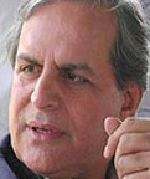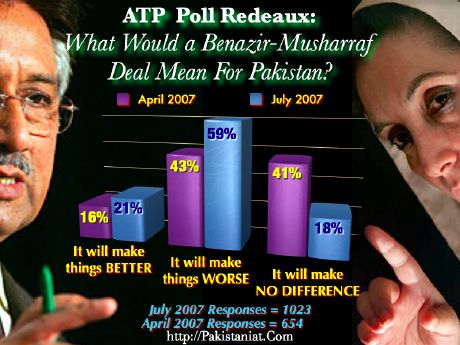Adil Najam
 The good news is that politics – in the good sense of the term – is back in Pakistan. The bad news is that it is not clear where it is going.
The good news is that politics – in the good sense of the term – is back in Pakistan. The bad news is that it is not clear where it is going.
Today we heard the news of the Supreme Court asserting its independence again by ordering the release of Javed Hashmi. I also want to share the results of our most recent ATP Poll – on the ‘new BB-Musharraf deal.’ I put it in inverted commas because there is much more speculation about this than fact.
But, before that, the news of the day. Which is that the Supreme Court has passed an order directing the concerned authorities to immediate issue the order for release of the incarcerated Muslim League-N Acting President, Javed Hashmi.
According to BBC News:
Pakistan’s Supreme Court has granted bail to opposition leader Javed Hashmi, who was jailed for inciting mutiny in the army, forgery and defamation. The former acting president of a Pakistan Muslim League faction was sentenced to 23 years in jail in 2004. Mr Hashmi was effectively serving at most seven years in jail as he was handed seven different prison terms running concurrently.
He was arrested in 2003 over a letter critical of President Pervez Musharraf. Mr Hashmi’s appeal against his sentence is yet to be taken up for hearing by the high court in Lahore. But the country’s Supreme Court, headed by Chief Justice Iftikar Chaudhry, acting on a separate review petition, granted Mr Hashmi bail saying that he had already served his sentence. “If periodic remissions are counted, he has already served his entire sentence,” Chief Justice Chaudhry said, while granting bail to Mr Hashmi. “Even if remissions are not allowed to him, he has nearly served the sentence, counting the length of his imprisonment before and during the trial,” he added.
… Javed Hashmi was arrested after circulating a letter bearing a military letterhead which was purportedly written by disgruntled officers. It called for an inquiry into alleged corruption in the army’s senior ranks and demanded a judicial investigation into a Pakistani military operation in Indian-administered Kashmir in 1999. The authorities claimed the letter, which was also highly critical of Gen Musharraf and his alliance with the United States, was a forgery. Mr Hashmi’s allies said they believed the letter was genuine and that the charges of forgery were politically motivated. He was convicted at a trial behind closed doors in the city of Rawalpindi, near Islamabad. Mr Hashmi’s trial was widely criticised as “politically motivated” by observers and opposition groups. The US and other foreign governments had expressed concerns over lack of transparency in the trial.
Is this a sign – one hopes – of a revitalized and energized Supreme Court after its reinstatement of the Chief Justice? We certainly hope so. Or is this a sign that the Musharraf government is reaching out not only to the PPP but also to the PML-N? That will also be a good thing. Or is the meaning of this something very different altogether?
Whatever its meaning, this, I think, is one more data point in the growing trend of ‘politics’ – in the good sense – having returned to Pakistan. The results of our most recent ATP Poll seems to suggest that same. But it also shows that there are more questions in Pakistan politics today, than answers.
Our recent Poll was a repeat of an earlier poll we had conducted back in April when rumors of such a deal had first surfaced. We asked the same question and gave the same options as before. That is: “What would a Benazir-Musharraf Deal Mean for Pakistan?” Of course, much had happened between April and July – including the Lawyers movement and the Lal Masjid operation – so we wanted to see how opinion of ATP readers had changed. Here is what we found:
First, the majority opinion remains that the deal will make things WORSE in Pakistan. Importantly, the percentage of people thinking so has increased – from 43 percent of the polled in April to 59 percent now.
Second, the percentage of people thinking that it will make things BETTER has also increased – from 16 percent to 21 percent. But this opinion remains a clear minority.
Finally, the paradox above is explained by the fact that the number of people who think it will make NO DIFFERENCE have gone down dramatically – from 41 percent to 18 percent. From the numbers it seems that the people who think it will make a difference has gone up drastically but most of them think it will make things only worse.
Like any web-based poll, this is only indicative of the type of people who visit our page and is NOT a scientific poll by any stretch. Some 654 people had voted in the April Poll and 1023 people voted in our July Poll. (I suspect, however, that the real number in teh second poll might have been less since some people were able to vote more than once because we moved computer servers during this period and because the poll was hosted outside ATP; however, I believe the results would have still been the same and were stable at these percentages nearly from the start).
The deal is seen to be more important now partly because it is seen to be more real. The real interesting question now is what explains this change and what does it mean. What do you think about this?
To me, this only reconfirms something that I had written in an article for The Friday Times last week on the All-Parties Conference (APC):
The good news is that politics – in the good sense of the word – is back in Pakistan. There is a palpable sense that people are tired of military rule. But what we are seeing is much more than boredom with authoritarianism. There is a clear realization that political problems need political solutions. That politics may not always be the most efficient way of doing things, but it is the most legitimate. That institutions do mater. That the great issues of state and policy cannot be resolved through simple managerialism. That nations need leaders, not Chief Executive Officers (CEOs).
The bad news is that the one group that seems even more unprepared for this sea change in public sentiment than Gen. Musharraf and the ruling PML-Q, are the opposition political parties. The recently concluded All Parties Conference (APC) demonstrated exactly how. On display in London was the same petty bickering, hollow sloganeering, lust for personal power, and the disconnect from the real problems of Pakistanis today that has so often turned so many Pakistanis away from these same political parties. It could be argued that the APC was the only good news that Gen. Musharraf has had in a very long time. It reminded Pakistanis of the poverty of political alternatives to military rule.
This is a great shame. The people of Pakistan seem quite ready – even eager – for a return to politics — and to meaningful democracy. If the APC is any indicator then it is not at all clear whether our politicians are.
… You have to stand up and say what you stand for. These are momentous times and the people of Pakistan want to be have a say in the nation’s future. This is not simply a question of who the next leader should be; it is a question of what the various leaders stand for. At the end of the day it does not matter if all the opposition parties are united. Why should they be? After all, they are competitors. But it does matter that the people of Pakistan know what the various political parties stand for and who they stand with. The APC failed for many reasons, at least one of them was that it was very evident who the parties stand against, but it was not at all clear what they stood for.





















































They (PMLN) do have skeletons in their closet, I am not arguing that.
But today they have taken a stance which resonates with the vast majority of Pakistanis i.e. no compromise with generals, they must take the army back to to the barracks and let the civilians rule.
Stepping away from PMLN, let me say that the party that best taps into the hatred against the army rule will win the elections, if they are held fair and square. PMLN and PTI are the parties poised to tap into this hatred against the army.
Sorry… I meant to highlight the names of the parties. What I meant was that it seems to me a bit of a contradiction to consider the PMLN/PTI as the “democrats” in this race. Granted, the others might be the “bootlickers,” but doesn’t the PMLN have its share of army-boosters?
Kruman:
Sohail,
PMLN/PTI will be in a coalition vs PMLQ/PPP/MQM.
MMA may split with Qazi joining PMLN/PTI.
A few months ago PMLQ stalwarts would poke fun at Nawaz Sharif saying he had merged his party with PPP. Interesting to see how the tide changes. Now it will be PMLQ and PPP fighting for the same votebank.
Until now elections in Pakistan have been between PPP and anti-PPP forces. Now that paradigm has changed. This time the election will be between bootlickers (like BB, PPP, PMLQ, MQM) vs the democratic forces (PMLN/PTI/Aitzaz Ahsan) who want the army to return to it’s consitutional duties.
In a free and fair election the bootlickers will get swept away, but that will not happen under the military regime.
Owais Mughal…
It occured to me too that it may just be a good political move to get Mush to shed the uniform and remain the president, and once he sheds the uniform, he loses his source of strength, which is his army… but it may be more complicated than that…
1) The 8th amendment is back, so even a non-uniformed Mush will have the power to sack the government when he likes…
2) To get rid of the 8th amendment (again), a 2/3rds majority will be required… not easy to do at all, given how the polls will be rigged to ensure a hung parliament if not one which puts the Q League in a position to form the government…
3) He may not be the COAS anymore, but he’ll still be perceived as the army’s man in the presidency, and the old days of the so-called “ruling troika” will return… the new COAS and the president (Mush) will gang up against the new PM, if the PM is someone from the current opposition that is… if they rig the polls to ensure a Q League victory, then the three will be part of one big team…
4) Since it is believed that BB is being pushed and prodded from Washington and London to come to an agreement with Mush, she’s unlikely to force his removal even if she could…
5) If her voters are angry at her, she may not even have much of a voice in the new parliament!
But one never knows… we may be dismissing her for being a bad politician and she may in the end deliver a master-stroke… who knows…